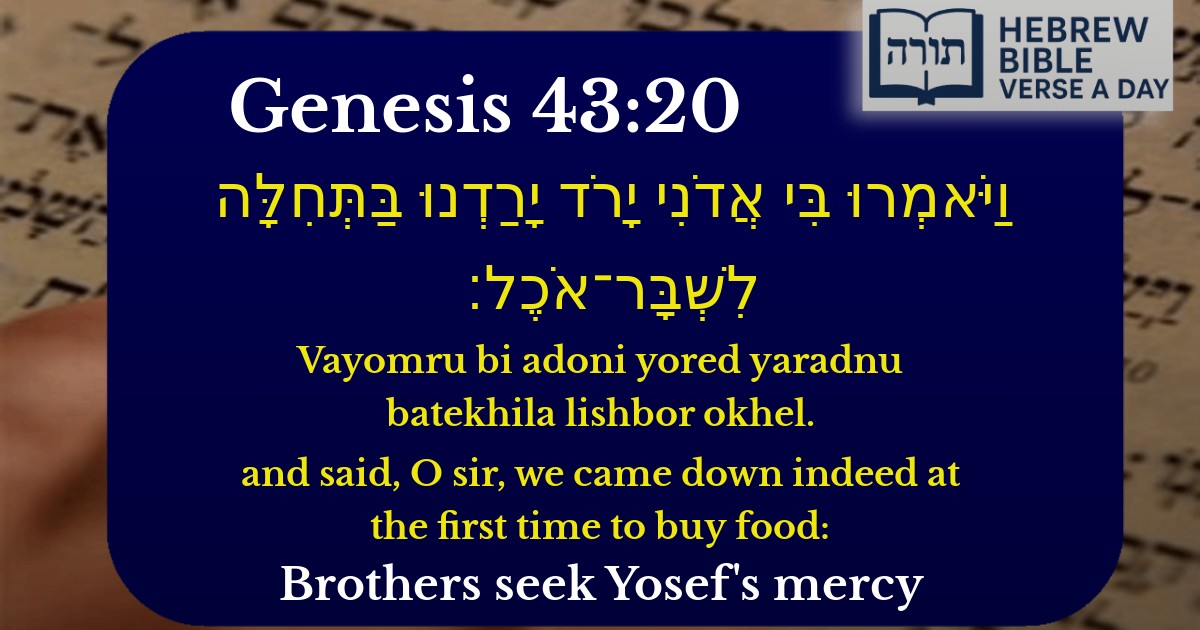Frequently Asked Questions
Q: What does Genesis 43:20 mean when Joseph's brothers say 'we came down to buy food'?
A: In Genesis 43:20, Joseph's brothers explain that they originally came to Egypt solely to purchase food during the famine, emphasizing their innocent intentions. Rashi notes that they were trying to clarify that they were not spies (as Joseph had previously accused them in Genesis 42:9), but honest men seeking sustenance for their family.
Q: Why did Joseph's brothers address him as 'my lord' (אֲדֹנִי) in Genesis 43:20?
A: Joseph's brothers called him 'my lord' because, at this point, Joseph was the viceroy of Egypt, and they did not recognize him as their brother. The Talmud (Chagigah 16a) teaches that showing respect to leadership is important, even when unaware of the leader's true identity, as honor is due to one's position.
Q: What lesson can we learn from the brothers' statement in Genesis 43:20?
A: The brothers' words teach the importance of honesty and transparency when dealing with others, especially in difficult situations. The Midrash (Bereishit Rabbah 91:7) highlights that their careful explanation shows the value of clear communication to avoid misunderstandings, a principle that applies in all relationships.
Q: How does the phrase 'at the first time' in Genesis 43:20 connect to the brothers' previous trip to Egypt?
A: The phrase 'at the first time' refers to their initial journey to Egypt (Genesis 42), where they bought food but were accused of being spies. Ramban explains that they were stressing their consistent, lawful purpose—seeking food—to prove they had no hidden motives, a lesson in maintaining integrity even under suspicion.


Context in the Torah Narrative
This verse (Bereshit 43:20) appears in the story of Yosef's brothers returning to Egypt for food during the famine. They are speaking to Yosef's steward, unaware that Yosef himself is the viceroy before them. The brothers emphasize that their initial descent to Egypt was solely for the purpose of buying food ("לִשְׁבָּר־אֹכֶל"), not for any ulterior motive.
Rashi's Commentary
Rashi notes that the brothers' phrasing "בִּי אֲדֹנִי" ("O sir") demonstrates their humility and deference to the Egyptian official (Yosef's steward). The term "בִּי" is an expression of entreaty, showing their respectful tone in attempting to clarify their innocence regarding the money found in their sacks from the previous trip.
Midrashic Insight
The Midrash (Bereshit Rabbah 91:7) highlights that the brothers stressed "בַּתְּחִלָּה" ("at the first time") to emphasize their pure intentions. They were not spies, as Yosef had accused them, but rather came solely out of necessity due to the famine. This aligns with their earlier claim in Bereshit 42:11 that they were "כֵּנִים" (honest men).
Rambam on Human Interaction
Rambam (Hilchot De'ot 5:7) teaches the importance of clear communication to avoid misunderstandings. Here, the brothers carefully articulate their purpose to dispel any suspicion, modeling proper conduct when addressing authority figures.
Linguistic Nuance